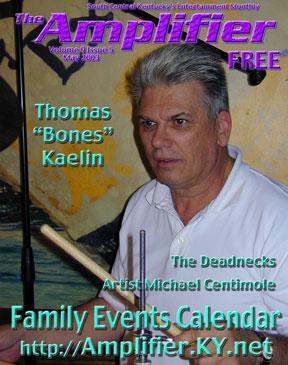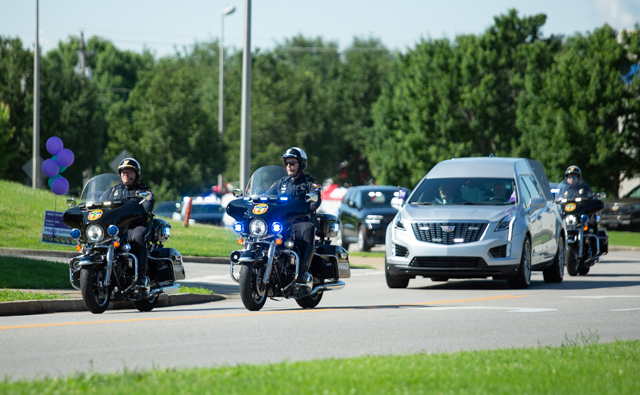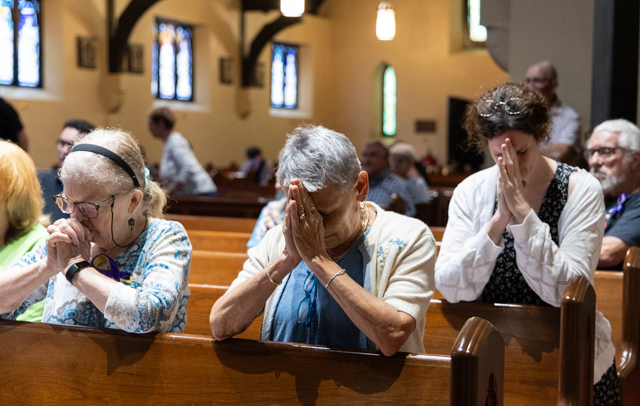Thomas “Bones” Kaelin
Published 12:00 am Wednesday, March 5, 2008

- Thomas "Bones" Kaelin
At the tender age of 8, when he first moved to Bowling Green, Thomas Kaelin knew he wanted to be a drummer, and after forty plus years of public performances, behind the kit remains his favorite place to be. “In fact I love it so much, I play for free” he says with a smile, “Course there is a charge for setting them up and tearing them down!” And drumming has been good to Kaelin, giving direction to his childhood, providing refuge from the battlefield in youth and keeping him young at heart throughout adulthood. Though it has been more than a decade since Thomas Kaelin retired from the music business, he remains a sought after player on the local scene, appearing several times a month as part of the Pain Killers or Timber Ridge and sitting in with various other local performers at The Spillway, Crossroads or any number of other music venues in the area.
Born in 1948 to musical parents, Thomas was dubbed Bones at an early age, as a reference to his slight stature. Though his father played trumpet with Jazz bands throughout the 40’s and his mother was a classically trained pianist, Bones, the eldest of ten children, was the only musically inclined sibling. He spent his preteens proclaiming his love of percussion instruments and banging on oatmeal boxes, pots and pans, garbage cans and anything else he could take a stick to, until at the age of thirteen, convinced it was more than a passing fancy, his parents broke down and bought him a used Slingerland set. It would be less than a year before he got his first taste of the spotlight, when his drum teacher no showed for a gig and the band called him as a last minute fill-in. After several repeat performances, he was included as a regular for their gig at “The Spot”, an early bar in the recently wet Bowling Green where the band featured standards like Elvis, Buddy Holly and Jerry Lee Lewis. Rodney Ball played guitar and Henry Sledge rounded it out with on piano. Sledge guided Kaelin’s talented to the next level, teaching him time signatures and that tempo was everything. “He told me �Just watch my foot’”.
From there Rodney Ball and Bones Kaelin joined forces with Jimmy Spinks and Gary Martin to form The Blues Kickers, which became a very popular party band featuring R&B and current top 40 hits. “We learned rock and roll as rock and roll was evolving” reminisced Bones. By the age of 17, with the Blues Kickers playing three nights a week at “Main Office Lounge”, the boys were enjoying an income higher than the school teachers that taught Bones by day. And the youngster’s celebrity was growing as he shared the limelight with several other bands on live TV three nights a week. Introduced to WBKO’s programming by Otis Blanton, as part of his Blue Star Rangers country show, Kaelin also performed a weekly Jazz show with Bob Flowers and Kenny Marshall and played top 40 on Charlie Fleners Dance Party every Saturday night.
In 1969, after graduating high school, Kaelin united with Ron “Stormy” Stronk on organ and Vern Pilder on guitar to form The Odd Squad. Pilder, currently plays with John Anderson, and though not a local musician he can often be seen sitting in with Gary Goodwin on Wednesdays for Happy Hour at the Travelodge. The Squad cut a deal with friend Donny Miller and his father who had leased Lost River Cave, and in exchange for rent on the rehearsal hall in the barn above the cave, the group played the nightclub below on weekends. After about a month of honing their skills, the band called an agent and hit the road. While playing the Wisconsin area, his country called, and though tempted by the nearby Canadian border, Kaelin returned home to fulfill his duty.
He went through basic training at Fort Campbell then was sent to Fort Lee. By the time he arrived in Atlanta, his CO discovered his talent and employed him to fulfill morale director’s duties, organizing entertainment for the post. They tried to keep him at the base to serve in this capacity, but eventually he was shipped to Vietnam. As soon as Kaelin was granted his first leave he marched to the Special Services office and informed them of his abilities and experience. From that moment on he spent the rest of his tour entertaining troops with Soul music from his 10 piece horn band. By day portable generators were set up and the band traveled the country by night, helicoptering into camps for a show and also playing the officers clubs. At the end of the year, he returned stateside and began readjusting to civilian life.
He settled in Kansas city where he formed a duo and then called and agent and relocated to Wisconsin the join a Soul band. But after only a few months, he found his way home to Bowling Green to attend Western Kentucky University. In no time he landed a steady three nights a week gig at The Wine Cellar, with bandmates Curtis Mays and Mike Bryzandine in a band called The Great Train Robbery, playing top 40. Following that he collaborated with Joe and Marilyn Addcock for a couple of years in The Company Store playing top 40, oldies and rock and roll variety. The group toured the US as well as Greenland.
In the mid seventies, a new band on the scene lost their drummer to Dr. Hook and Bones was asked to take over. The band was called Tennessee Pulley Bone. The group also featured Ken Smith (not the Ken Smith of local fame), Tom Hamilton and Dave Gillon. As Kaelin joined, their recently released record hit 35 on the charts. Don Williams, the main act for their shows (Pulley Bone warmed up and then took the stage as Williams back up band) had the honor of being the first country artist to have five singles on the charts at the same time. And now Tennessee Pulley Bone won the privilege of being the first country band ever to have a single in the charts and as Rolling Stone put it in April 1977, they had become “one of the pioneer acts in what has become known as country rock…”. Before The Door is Always Open was released, the world of country music was ruled by singles and duos. After their label folded, the band went on to a record deal with RCA where they enjoyed two more successful singles and began touring with the likes of Willie Nelson, Bobby Bare, Freddy Fender, Gary Stewart and numerous others. About a third of their songs were written by Dave Gillom who also wrote hits for others such as Roy Clark or Kenny Rogers. The band also recorded several demos, that just didn’t catch on with a full band, such as I’m Just An Old Chunk of Coal, Some Days Is Diamond Some Days Is Stone and The Gambler, but later found fame with solo artists such as Billy Joe Shaffer, John Denver and Kenny Rogers. According to Hank, a Tennessee music magazine, “What we’ve got here are four one time R&B and Top Forty pickers who have found a home with a style that’s unusual for the Nashville area. It’s country, R&B, bluegrass rock with Beachboys overtones. Some of the most interesting stuff they do is electric bluegrass tunes like Bill Monroe’s Uncle Pen, even with Tom Hamilton playing five string banjo, it still sounds like a dance record from Soul Train. What the Pulley Bone does is hard to explain but it’s easy to enjoy.” Their union lasted from 1973 to 1979 but it eventually became apparent that they were too country for rock and roll and to rock for country. Besides, the agents just didn’t know how to handle a country music band so they decided to throw in the towel.
Frustrated with the music business and its ineptness in handling the band, Bone retired and opened the Camelot Picking Parlor in Bowling Green. The small listening room, seating 70 featured acts like New Grass Revival, Gold Scribner and Doc Watson. He also subcontracted light and sound jobs with WKU and other venues. Then he ran into Tommy Johnson, who had been a fan of Tennessee Pulley Bone and the two decided to take the format to a new level. The picking parlor sold and became the Limelight where the new band and Johnson’s songwriting became a regular feature. In the beginning Dixieline consisted of Tommy Johnson, Bones Kaelin, Cecil Pryor and Tommy Hendricks. They paired similarly to Pulley Bone and Don Williams with artist Jebry lee Briley, a Jazz singer converting to country and became both her opening act and back up band. She added her unique influences to staples like Bill Monroe’s In the Pines giving them a gospel, bluesy flair. Some described them as a “countryfied Manhattan Transfer” due to the strong vocal support and harmony from all the musicians. According to Kaelin, “since we had no horns, our voices became the horns.” The band split from Briley after about a year and a half and had some lineup changes, adding Danny Dotson on steel guitar and a second keyboardest, Henry Paulkas, who had been classically trained at Juliard and grown bored of the European circuit. The group worked on itself, recording in Bill Bitners studio combining country, R&B, rock, jazz and classical for their new sound. They featured songs of both Tommy Johnson and Dave Gillon. Then in the mid 80’s, they discovered a young classically trained fiddle player named Chris Carmichael and the band evolved to it’s final lineup of Kaelin, Johnson, Dotson, Hendricks and Carmichael. They were still one of the only country bands on the scene and according to Kaelin “Our music was so far ahead of its time that even today people can’t believe it was done in the 80’s. It took Nashville to the early 90’s to realize the influence of rock on country music.”. But in the end Dixieline repeated the seven year run that Pulley Bone had enjoyed and suffered its demise for the same reasons.
Again Bones retired from the business, this time opening the locally legendary Yankee Doodles which also ran a seven year stint of success. The 8,000 square foot venue remains one of Bowling Green’s most successful dance/show clubs. It featured variety top 40 bands from 4 piece to 14 piece horn bands, boasted the first live pay per view boxing match viewing and catered to nearly 1000 people a night.
In 1997, Bones decided to relocate to Florida, playing weekend gigs with a trio. However it wasn’t long before he was back in Bowling Green, setting in with various groups. His old pal Tommy Johnson had started the Pain Killers in his absence, but the group was now defunct and the two decided to reorganize it. Rounding out the lineup were Eric Albany on bass, Dover Cooper on harmonica and Gary Graves on Sax. More recently Michael Holmes joined on keyboards and Graves and Cooper left. The band features class rock and R&B, with all members singing both leads and harmonies. A second incarnation of the group, dubbed Timber Ridge, features a more country based sound, with Dennis Adkins on guitar. Timber Ridge features both Adkins and Johnson’s songs as well as selections from Tennessee Pulley Bone and Dixieline.
Both formations are enjoying popular success with regular gigs at locations such as Crossroads Lounge in Ramada Inn and The Spillway Bar and Grille. There is also some talk of a Dixieline reunion and a rerelease of some of their old tunes as well as some recording at Hendrick’s 4th Floor Studios of some new material. By day, Thomas Bones Kaelin has enjoyed success in sales, but his nights have always remained busy since his retirement from the music business. He credits his continued position of one of the area’s most sought after talents with his 31/2 octave range voice that allows him to harmonize any part from alto to baritone as well as his eclectic history, spanning so many music genres. At 54, he admits drumming is quite a physical work out, but the fact remains, to this day “I feel more comfortable behind a set of drums than any other place in life, it’s my drug of choice.”
Kim Mason is the Content Manager of the Amplifier which was founded by her in 1995. She serves as Executive Director for the BG International Festival and designs websites. www.kimmason.ky.net






